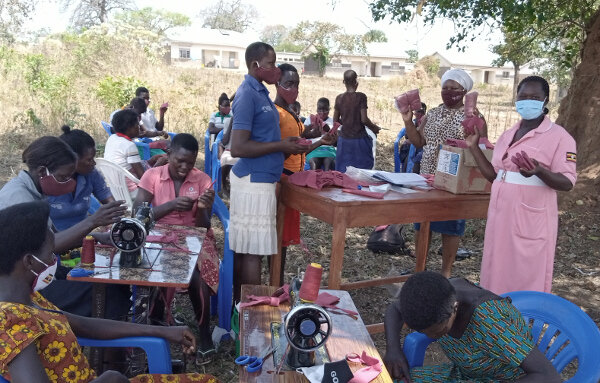Women and Children First is helping teenage girls make their own reusable sanitary towels, enabling them to attend school, supporting them with their lives and livelihoods.
The initiative, taking place in Oyam, Uganda, is also seeing the girls make their own cloth masks and liquid soap, to reduce the risks of catching the coronavirus.
Jo Drazdzewska, Head of Programmes, explains more about the work.
“There is no sexual education in schools, meaning puberty is often misunderstood by girls and boys. Families often cannot afford sanitary products, which are prohibitively expensive.
“Often one pack costs more than the daily cost of living, the equivalent of paying in excess of £35 in the UK. This is unthinkable given the strides made in tackling period poverty recently, making pads and tampons more readily available.
“This results in girls having to use rags that do not offer protection nor comfort, so they miss school when they are on their period.
“These young girls receive no proper support at home, in school and within the community.
“A study has found more than half of girls miss school at least once each month because of menstruation. Less schooling puts them at risk of early marriage, domestic abuse, increased health problems and locks them in the vicious cycle of poverty.
“By raising awareness and improving access to affordable, good-quality reusable sanitary pads for girls in school and community, helps the girls and teenagers can get the education they need.
“The training started with 22 adolescent champions, teenage girls who have already received training from Women and Children First and our partner, Doctors with Africa CUAMM, to talk with their peers about puberty and sexual and reproductive health.
“These trainees were able to produce finished products, including liquid soap and cloth masks in addition to the sanitary pads. The girls enthusiastically commented about the knowledge and skills they gained from the training.
“Under the supervision of the trainer and the tailor, the 22 adolescent champions then trained a further 178 girls in how to make these essential items. These girls can then train others to hand-make pads.
“We took on board comments from the girls that in the past there was a sewing training organised but there was not enough material provided so we ensured we included enough raw materials. The girls came away with sample pads, ready to do production in large quantity.
“We still have materials that can produce up to 700 single pads per production site. There is access to machines and girls can book sessions with trained champions to learn basic skills in using sewing machines.
“Each girl has access to four reusable sanitary pads, lasting them for 4 months, half a litre of liquid soap and two reusable masks each.
“The initiative has been commended by local leaders and community members, as it provides the young women with both life skills – sewing and manufacturing – as well as affordable, reusable sanitary towels.
“Moving forward, we are looking to get further funders to provide support for the purchase of more raw materials to make more reusable pads. We are also hoping to potentially get a Youth Social worker to coordinate training for more girls to use a sewing machine.”
Thanks to The Light Fund for their help in supporting the project, Baylor University and to our donors in enabling our work to help more teenage girls thrive in society.


